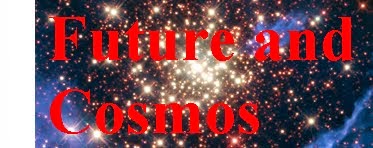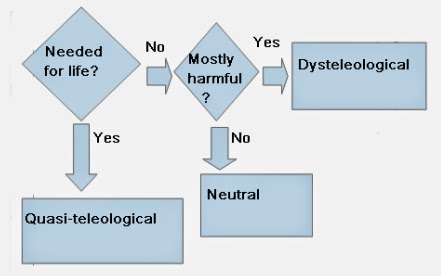Scientists
study the laws of nature in great detail, but it is relatively rare
for anyone to attempt a qualitative assessment of the laws of nature.
We might do such a thing by imagining three different quality
categories. If a law of nature seems to serve a good purpose, we
might call that law quasi-teleological, a term that means “as if it
was intended for a purpose.” If a law of nature seems to serve a
bad purpose, we might call it dysteleological, a term that means “as
if it was intended for a bad purpose.” If a law of nature seems to
serve no purpose either good or bad, we can simply call it neutral.
Let
us attempt to judge whether the most important laws of nature fall
into any of these three categories. One way to do that it is to make
judgments based on random incidents, or incidents chosen to support a
particular viewpoint. You would be following that approach if you
made statements like this:
I was hiking yesterday in the mountains, and hurt my leg when I slipped and fell. Damn that stupid law of gravity! It's such a terrible law.
Making
assessments of laws of nature based on incidental experiences such as
this does not make any sense. What we need is an intelligent
general-purpose algorithm for assessing whether a law of nature is
quasi-teleological, neutral, or dysteleological. I propose the
algorithm shown in the flowchart below.
The
algorithm starts by asking: is the law of nature necessary (directly
or indirectly) for the existence of living things such as ourselves?
If the answer to question is “Yes,” the law is considered
quasi-teleological, because it helps to achieve a good purpose (the
purpose of allowing creatures such as us to exist). If the answer is
“No,” the algorithm then asks whether the law of nature is mostly
harmful in its effects. If the answer to that second question is
“Yes,” the law of nature should be considered dysteleological (a
law that serves a bad purpose). If the answer to that question is
“No,” the law is considered to be neutral (meaning that it
neither seems to serve a good purpose, nor seems to serve a bad
purpose).
Let's
try a simple example, and see whether the algorithm seems to make
sense. Consider the case of the law of gravitation, the universal law
of nature that there is a force of attraction between all massive
bodies, directly proportional to the product of their masses, and
inversely proportional to the square of the distance between them.
Gravitation is (indirectly) absolutely necessary for the existence of
living beings, because if it were not for gravitation we would have
neither a planet to live on, nor a sun to produce warmth. So even
though occasionally gravity produces deaths from falling, the fact
that gravitation is absolutely necessary for planets decisively
trumps all other considerations. It is therefore absolutely correct
for us to consider gravitation as a quasi-teleological law. It serves
the good purpose of allowing the existence of planets for living
things to exist on. In this case the algorithm seems to steer us to
the right answer.
Let
us apply the same algorithm to other major laws of nature. Another
major law of nature is Coulomb's law (the basic law of
electromagnetism). This is the law that between all electrical
charges there is a force of attraction or repulsion, directly
proportional to the product of their charges, and inversely
proportional to the square of the distance between them. It is true
that very rarely this law helps to kill people in lightning strikes,
but that fact is absolutely trumped by the fact that living things
could not exist for even a minute without Coulomb's law.
Electromagnetism is what makes chemistry possible, and without
chemistry we would all instantly die. If you were to turn off
Coulomb's law, our bodies would quickly disintegrate. So again, using
the above algorithm, we must classify Coulomb's law as a
quasi-teleological law, as it serves the good purpose of allowing the
existence of biological organisms.
The
table below shows a list of fundamental laws of nature. Most of the
laws have commonly used names, but some very important laws do not
have any common name, although they should have one. One of the most
important laws is one I have designated below as the Law of the Five
Allowed Stable Particles. This is simply the law that rather than
producing hundreds or thousands of different types of stable
particles from a high-energy particle collision, nature makes sure
that only five types of stable particles result. Although not
important now, the current arrangement of matter in the universe
would be hopelessly different (in a very negative way) if such a law
had not applied shortly after the Big Bang, when all the particles in
the universe were colliding together at high speeds. You can say the
same about the other conservation laws listed below.
All
of these laws have one thing in common: for various reasons, all of
them are necessary for the existence of life. In the case of the law
of the strong nuclear force, the Pauli exclusion principle, and the
law of electromagnetism, this is glaringly obvious, as we couldn't
exist for even a minute if these laws didn't exist. In the case of
the law of gravitation, it's almost as obvious that it is required
for life, as gravitation is absolutely necessary for the existence of
planets. In the case of the law of the conservation of baryon number,
this college physics textbook says, “if it were not for the law of
the conservation of baryon number, a proton could decay into a
positron and a neutral pion.” If such a decay were possible, there
wouldn't be any protons around by now, nor would there be any life.
In
the case of the law of the conservation of charge, the law guarantees
that electrons are stable particles that cannot decay into neutrinos,
and thereby assures that we have a universe with plenty of the
electrons needed for atoms and life. In the case of the laws of
quantum mechanics, we have laws that restrict the states that
electrons can take inside an atom, and thereby prevent electrons from
falling into the nucleus of an atom (something they would otherwise
have a strong tendency to do because of the very strong
electromagnetic attraction between protons and electrons).
As
all of these laws are needed for life, we must characterize all of
them as quasi-teleological. But
other laws of nature should be classified as neutral, because they do
not seem to have any bad effect nor any good effect.
Although the modern materialist scientist may attempt to banish teleology from nature, such an attempt is not at all supported by his subject matter. The quasi-teleological nature of the main laws of nature present a huge problem for those who wish to believe in a capricious universe whose characteristics are the result of blind chance. Such people have not only the huge problem of explaining the universe's fine-tuned fundamental constants, but also the problem of explaining the universe's fine-tuned laws.
Although the modern materialist scientist may attempt to banish teleology from nature, such an attempt is not at all supported by his subject matter. The quasi-teleological nature of the main laws of nature present a huge problem for those who wish to believe in a capricious universe whose characteristics are the result of blind chance. Such people have not only the huge problem of explaining the universe's fine-tuned fundamental constants, but also the problem of explaining the universe's fine-tuned laws.



No comments:
Post a Comment